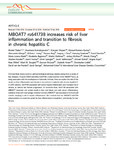MBOAT7 rs641738 increases risk of liver inflammation and transition to fibrosis in chronic hepatitis C.
| dc.contributor.author | Khaled Thabet,, | |
| dc.contributor.author | Anastasia Asimakopoulos, | |
| dc.contributor.author | Maryam Shojaei, | |
| dc.contributor.author | Manuel Romero-Gomez, | |
| dc.contributor.author | Alessandra Mangia, | |
| dc.contributor.author | William L. Irving, | |
| dc.contributor.author | Thomas Berg, | |
| dc.contributor.author | Gregory J. Dore, | |
| dc.contributor.author | Henning Grønbæk, | |
| dc.contributor.author | Sheridan, David | |
| dc.contributor.author | Maria Lorena Abate, | |
| dc.contributor.author | Elisabetta Bugianesi, | |
| dc.contributor.author | Martin Weltman, | |
| dc.contributor.author | Lindsay Mollison, | |
| dc.contributor.author | Wendy Cheng, | |
| dc.contributor.author | Stephen Riordan, | |
| dc.contributor.author | Janett Fischer, | |
| dc.contributor.author | Ulrich Spengler, | |
| dc.contributor.author | Jacob Nattermann, | |
| dc.contributor.author | Ahmed Wahid, | |
| dc.contributor.author | Angela Rojas, | |
| dc.contributor.author | Rose White, | |
| dc.contributor.author | Mark W. Douglas, | |
| dc.contributor.author | Duncan McLeod, | |
| dc.contributor.author | Elizabeth Powell, | |
| dc.contributor.author | Christopher Liddle, | |
| dc.contributor.author | David van der Poorten, | |
| dc.contributor.author | Jacob George, | |
| dc.contributor.author | Mohammed Eslam, | |
| dc.date.accessioned | 2016-09-22T10:07:42Z | |
| dc.date.available | 2016-09-22T10:07:42Z | |
| dc.date.issued | 2016-09-15 | |
| dc.identifier.issn | 2041-1723 | |
| dc.identifier.issn | 2041-1723 | |
| dc.identifier.other | 12757 | |
| dc.identifier.uri | http://hdl.handle.net/10026.1/5474 | |
| dc.description.abstract |
<jats:title>Abstract</jats:title><jats:p>Cirrhosis likely shares common pathophysiological pathways despite arising from a variety of liver diseases. A recent GWAS identified rs641738, a polymorphism in the <jats:italic>MBOAT7</jats:italic> locus, as being associated with the development of alcoholic cirrhosis. Here we explore the role of this variant on liver inflammation and fibrosis in two cohorts of patients with chronic hepatitis C. In 2,051 patients, rs641738 associated with severe hepatic inflammation and increased risk of fibrosis, as well as fast fibrosis progression. At functional level, rs641738 associated with MBOAT7 transcript and protein levels in liver and blood, and with serum inflammatory, oxidative stress and macrophage activation markers. MBOAT7 was expressed in immune cell subsets, implying a role in hepatic inflammation. We conclude that the <jats:italic>MBOAT7</jats:italic> rs641738 polymorphism is a novel risk variant for liver inflammation in hepatitis C, and thereby for liver fibrosis.</jats:p> | |
| dc.format.extent | 12757- | |
| dc.format.medium | Electronic | |
| dc.language | en | |
| dc.language.iso | en | |
| dc.publisher | Springer Science and Business Media LLC | |
| dc.subject | Acyltransferases | |
| dc.subject | Carcinoma, Hepatocellular | |
| dc.subject | Case-Control Studies | |
| dc.subject | Cohort Studies | |
| dc.subject | Disease Progression | |
| dc.subject | Fatty Liver | |
| dc.subject | Female | |
| dc.subject | Hepatitis C, Chronic | |
| dc.subject | Humans | |
| dc.subject | Immune System | |
| dc.subject | Liver Cirrhosis | |
| dc.subject | Liver Neoplasms | |
| dc.subject | Macrophage Activation | |
| dc.subject | Male | |
| dc.subject | Membrane Proteins | |
| dc.subject | Middle Aged | |
| dc.subject | Oxidative Stress | |
| dc.subject | Polymorphism, Single Nucleotide | |
| dc.title | MBOAT7 rs641738 increases risk of liver inflammation and transition to fibrosis in chronic hepatitis C. | |
| dc.type | journal-article | |
| dc.type | Journal Article | |
| dc.type | Research Support, Non-U.S. Gov't | |
| plymouth.author-url | https://www.webofscience.com/api/gateway?GWVersion=2&SrcApp=PARTNER_APP&SrcAuth=LinksAMR&KeyUT=WOS:000385382100003&DestLinkType=FullRecord&DestApp=ALL_WOS&UsrCustomerID=11bb513d99f797142bcfeffcc58ea008 | |
| plymouth.issue | 1 | |
| plymouth.volume | 7 | |
| plymouth.publication-status | Published online | |
| plymouth.journal | Nature Communications | |
| dc.identifier.doi | 10.1038/ncomms12757 | |
| plymouth.organisational-group | /Plymouth | |
| plymouth.organisational-group | /Plymouth/Faculty of Health | |
| plymouth.organisational-group | /Plymouth/Faculty of Health/Peninsula Medical School | |
| plymouth.organisational-group | /Plymouth/REF 2021 Researchers by UoA | |
| plymouth.organisational-group | /Plymouth/REF 2021 Researchers by UoA/UoA01 Clinical Medicine | |
| plymouth.organisational-group | /Plymouth/Users by role | |
| plymouth.organisational-group | /Plymouth/Users by role/Academics | |
| dc.publisher.place | England | |
| dcterms.dateAccepted | 2016-07-29 | |
| dc.identifier.eissn | 2041-1723 | |
| dc.rights.embargoperiod | Not known | |
| rioxxterms.versionofrecord | 10.1038/ncomms12757 | |
| rioxxterms.licenseref.uri | http://www.rioxx.net/licenses/all-rights-reserved | |
| rioxxterms.licenseref.startdate | 2016-09-15 | |
| rioxxterms.type | Journal Article/Review | |
| plymouth.oa-location | https://www.nature.com/articles/ncomms12757 |


